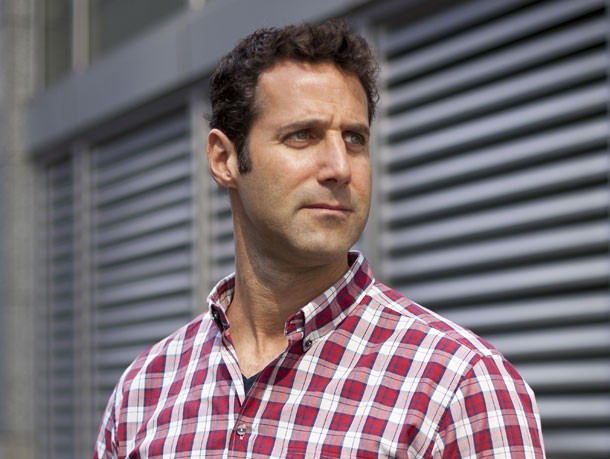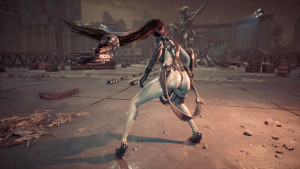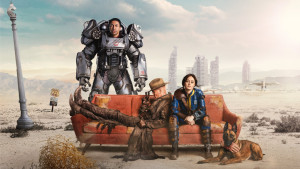Please support Game Informer. Print magazine subscriptions are less than $2 per issue
Interview: Jason Rubin Talks About THQ's Struggles And Final Days

When Jason Rubin joined THQ less than a year ago, he was brought in to help the company with his years of experience crafting excellent games with Naughty Dog. Unfortunately, THQ could not be saved, leaving Rubin and the company with the difficult task of assessing options, filing for bankruptcy, and ultimately selling off the company's assets. In a candid interview, Rubin talks about his stewardship of the company and his firm belief that gamers will be blown away by some of the great titles THQ had waiting in the wings.
-------------------------------------------------------------------
Game Informer: When you joined THQ, the company was in trouble. What did you set out to accomplish?
Rubin:
When I joined THQ at the end of May, 2012, the company was finishing a
massive downsizing. The company had pared itself down to just the most
talented teams and profitable assets after being in a largely
unprofitable kids and license business for many years. Additionally,
uDraw and the cancelled MMO had created massive losses.
And the teams and project that remained had challenges as well. The teams were incredibly talented, but almost all of them had faced roadblocks that were impacting the quality of the games.
Remembering the way that Sony Computer Entertainment had created a supportive, nurturing relationship with Naughty Dog, and the way that relationship had led (and still leads!) to great titles, I set out to fix the problems I saw.
The good news is that the projects were fixable. Good developers in good environments make good games. I believe that even though only seven months have passed, the decisions I made had a material impact on the quality of the resulting titles.
And for the record, I am only claiming that I cleaned up the process, not responsibility for the design or content. For that, the teams deserve all of the credit.
All of the titles in the portfolio now have the potential to be the great games they should have been. And now that the THQ auction is over, I can also say that the majority of them have found homes and will ultimately reach their intended audience, the core gamer.
Unfortunately, the financial bottom dropped out on THQ before we got to see the fruits of our labor, and I spent the rest of my time at THQ trying to fix non-game issues.
To be clear, I am not claiming that everything I did was successful or that my time at THQ was without failings. I failed to find Vigil a home. Having just finished a product, Vigil was farthest from release of their next game, and we were not able to garner any interest from buyers, despite a herculean effort. Additionally, they were working on a new IP, which meant even more risk for a buyer.
And of course, unfortunately THQ’s non-development personnel are out of work as of the end of this week; this was a casualty of the court’s decision to allow piecemeal sale of assets.
As I type this, I cannot think of anything that I could have done to change the outcome. But I can tell you that I will spend a lot of sleepless nights thinking about what I could have changed. Even if I can’t figure out what I could have changed, I accept those results as failure. I am not dodging that responsibility.
And I would encourage the press, before they judge anybody at THQ, or the process, to reach out to a number of employees and ask them if what I have said above is true. I believe they will corroborate my views.
Do
you think mid-sized publishers/developers like THQ can survive in an
industry that's filled with large-size companies like EA on one hand and
indies on the other?
That is a great question, and one I spent a lot of time working on answering.
I believe that in the near future, digital distribution and alternate business models will bring a greater percentage of dollars spent on games back to the publisher/developer. Based on that change, in a few years, a THQ would be able to survive, and larger publishers will be even more profitable. But the next few years of transition are going to be incredibly challenging for all AAA game companies.
Clearlake was to provide the capital to bridge THQ to that eventuality. Time will tell if I am right, but unfortunately I will not be able to prove the idea with THQ.
You went into a troubled situation at THQ. At what point did you know the writing was on the wall?
I
had a gut feeling within a couple of weeks of starting that the company
was worse off than I had believed and was heading for some major
change. It wasn’t until much later that the books actually showed that
my intuition was right.
However, the team at THQ are fighters, and through fixing product, turning to fixing finances, raising money, finding a partner in Clearlake, and filing for Chapter 11, I always believed that THQ would survive.
The first time I thought that there was a material chance that it would not work out was on January 4 when the plan with Clearlake was delayed by two weeks and the court allowed bidding on individual assets. From that point on, it was anybody’s guess what would happen.
Did THQ's financial problems affect any of the games in development?
Until
the filing for Chapter 11, I do not think that the financial situation
materially impacted the titles. Certainly all of the articles headlined
with the THQ logo and the downward stock graph weren’t helping morale,
but I think it was mismanagement, not financial restrictions, that
impacted the teams and products before I started at THQ.
I think the best way to gauge the six months between when I started and the filing is to ask the teams how things were going. Their emails seem to indicate that things were going well.
After the filing, which was only about a month ago, things got difficult, but THQ still had a low attrition rate, and I think employees were excited about the Clearlake future.
After the uncertainty created by the courts decision on January 4, the stress level went way up as the uncertainty of an outcome crept in. We’ll know the impact after the teams settle into their new homes.
You
obviously saw all the products while they were in development. Which
ones do you have the most hope for and think can thrive in their new
homes? Which ones do you think will still need more work to see their
potential?
I did more than see the products while they were in
development. I played them, worked on them, and talked with the teams
about their future. I think the slate has a huge potential, and I look
forward to seeing the titles reach the market.
Asking me which title is my favorite is like asking a father to name his favorite child. And of course I can’t comment on the new owners.
But I will say this: The price that the teams and products “went for” at auction seem to me to have no bearing on the underlying value. If someone tries to judge the quality of the products by the price paid for them they are doing themselves no favor.
The best example of this is Vigil’s title, codenamed Crawler. When the teams got together recently to show each other their titles, Crawler dropped the most jaws. It is a fantastic idea, and truly unique. The fact that nobody bid for the team and title is a travesty. It makes no sense to me. If I weren’t barred from bidding as an insider, I would have been there with my checkbook. I’m sure that’s little consolation to the team, but that’s a fact.
What
happens to THQ's back catalog – especially for franchises that THQ once
owned, but weren't sold off? What happens to properties like Darksiders
and Red Faction?
There will be a separate process to sell off the back catalog and IP. That process will take place in the coming weeks.
What are you going to do next?
My
focus right now is helping the THQ employees who are out of work find
jobs. I am lucky enough that this process doesn’t negatively impact my
family. That is not true for hundreds of people.
It would be selfish to think about myself right now.










